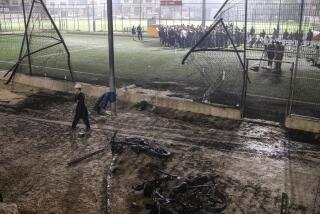Deadly Explosion Angers Neighborhood
- Share via
BAGHDAD — An explosion Saturday at a U.S.-managed munitions dump that killed at least six Iraqis prompted anti-American protests and sharp criticism from residents.
The first explosion occurred at 8 a.m. and could be heard miles away, shattering windows and damaging houses in the modest Zaafaraniyah neighborhood on the southeastern edge of the city.
Large blasts continued into the late afternoon.
The six who died were members of the same family. At least 25 people were injured, hospital officials said.
It appeared likely that Iraqi gunfire or explosives set off the explosions, according to reports from the U.S. military as well as interviews with people at the scene.
But numerous residents immediately directed their outrage at the Americans, signaling that many Iraqis are ready to see the worst in anything that involves the U.S. military.
Several groups are highly motivated to demonize the Americans, most notably the Fedayeen Saddam -- fighters for former Iraqi President Saddam Hussein -- and some fundamentalist Shiite Muslims, who want the Americans to leave the country immediately to facilitate the establishment of an Islamic state.
“We expect this behavior from Americans because they are terrorists. It’s what Israel does to the Palestinians, and now America is doing it to the Arabs,” said resident Abu Jabbar as he watched the coffins of those killed in the blast being carried into a nearby house for the period of mourning.
A crowd along the road leading past the Americans’ camp near the ordnance dump shouted, “Bush, Bush, criminal!” and the military warned Western reporters covering the incident to be on guard against attacks.
U.S. military officials in Baghdad said they were unsure whether gunfire between rival local factions or an intentionally fired incendiary device sparked the explosions, which, once started, were impossible to halt.
However, the U.S. Central Command in Doha, Qatar, issued a statement blaming the explosions on an assailant or assailants who “fired an unknown incendiary device into the cache, causing it to catch fire and explode.”
The site is one of several in Baghdad where the U.S. is storing munitions, including missiles, gathered in raids on Iraqi installations.
The idea that Iraqis could have been at fault was largely rejected by residents. Though none said the Americans had deliberately set off the explosions, they blamed them for putting a munitions dump near a civilian area, or said that everything had been fine until a few days ago when the troops began to store Russian-manufactured Frog missiles there.
“Why did they collect the missiles here in a populated area?” asked Shakur Hamoud Nasser, a surgeon, who was volunteering at the hospital to help deal with the casualties.
“There are many deserts in Iraq,” he said.
Col. John Peabody of the U.S. Army’s 11th Engineer Brigade said 80 missiles, including Al Samouds and Frogs, were stored at the dump. Peabody said the site, which has a sign outside the gate saying it is a “technical administrative institute,” was actually an existing Iraqi munitions dump.
Other military officials on the scene said the Americans had added the weapons they found in recent days around Baghdad to the dump.
The dump was also a major antiaircraft site, probably used to protect the southern entrance to the capital, and was equipped with 12 antiaircraft guns before the war, according to Khatan Abbas, 35, who lives across the road and works as a muezzin, calling the faithful to prayer.
Abbas was distraught over the incident, which had destroyed much of the one-room house he shares with his wife and two daughters and left rocket-propelled grenades, shrapnel and a couple of missile heads nearby.
Several missiles survived the explosion because they were stored at some distance from where most of the blasts occurred. They appeared to be on flatbed trucks.
The deaths of six of the 14-member Hassan family, longtime residents of the neighborhood, left a husband without his wife and at least one child without her mother.
“Please, I don’t want anybody to say, ‘I’m sorry.’ I don’t want to hear that word,” said Thamer Hassan, 29, whose father and wife died as a result of the explosion.
“If I die it’s better for me. I lost my whole family. I can’t believe my father has been killed,” he said.
Hassan’s 18-month-old daughter, Zaineb, lay about a mile away at the ill-equipped local hospital, where doctors had stitched cuts on her head, leg and arms but were unsure what to do for what they said appeared to be a fractured rib.
By late afternoon she had become a symbol of what residents described as American cruelty. She was held up repeatedly for television cameras, and a sign was posted near where she was being examined that equated President Bush with Hussein.
“Let the world see what Bush and Saddam did to us,” the sign said.
The explosion damaged sewer lines in the hardest-hit area, creating a large crater filled with foul-smelling water.
“It was a very big explosion, my house was shaking this way and that,” said Nasser, the surgeon, as he tended to a 14-year-old boy who had cut his hand when he fell off his motorcycle onto broken glass that lined the streets. The teenager moaned as Nasser sewed his cut without anesthetic.
Although some people blazed with anger, others sounded just deeply disappointed.
“I personally agree with having American troops here in Baghdad,” said Mohammed Ghazi, 48, who owns several small stores in the area and knew the people who were killed. “I would like them to be here for a while and I don’t care who is going to run the country, but it is a very bad attack that happened today. It was a very bad day.”
More to Read
Sign up for Essential California
The most important California stories and recommendations in your inbox every morning.
You may occasionally receive promotional content from the Los Angeles Times.










